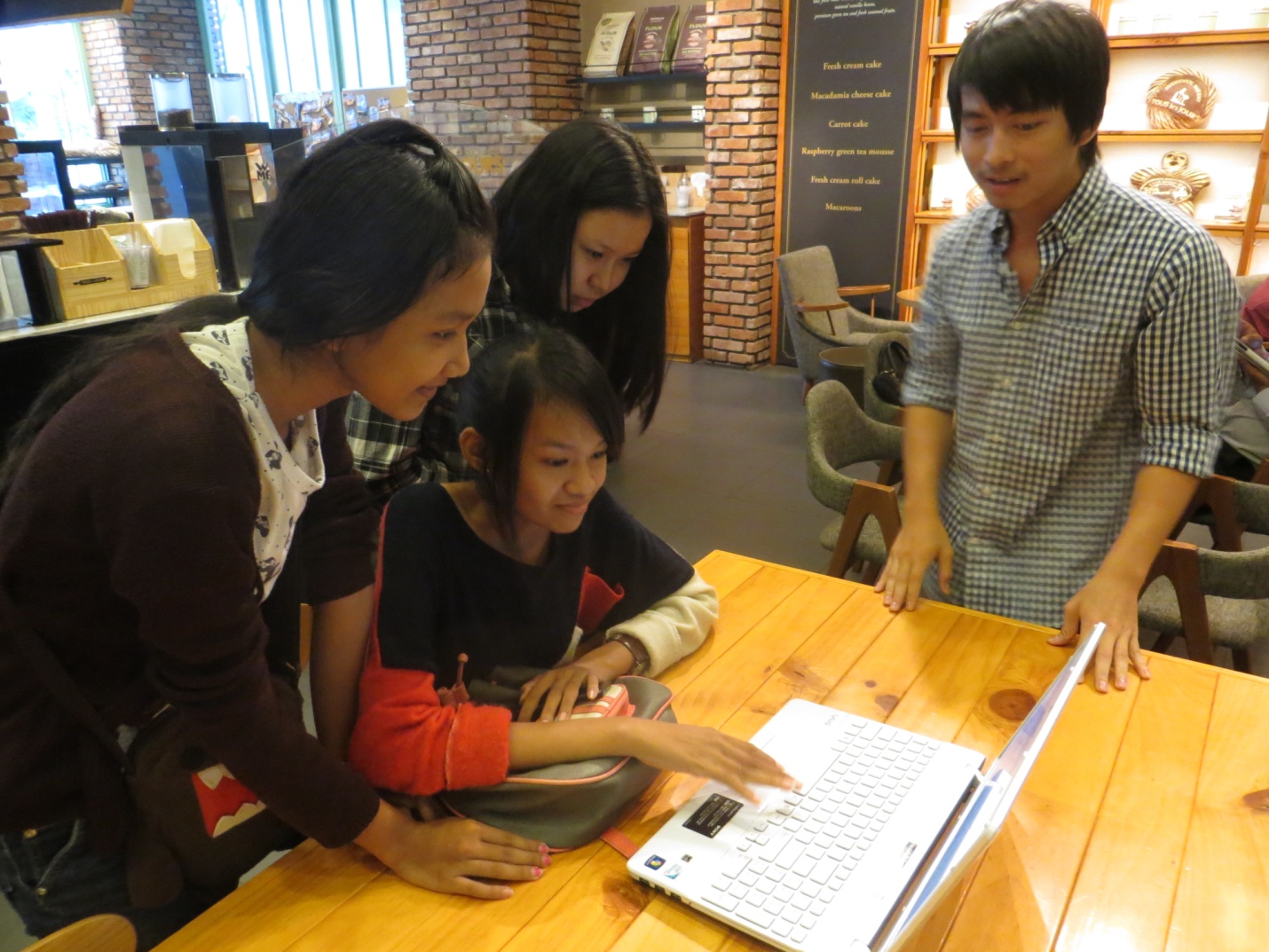Press Release: Open Development Cambodia Launches Election Page

Students Check Out ODC’s New Elections Page at a Local Coffee Shop
An Election Info Smorgasbord
Open Development Cambodia (ODC) Posts a Wealth of Data
on the Kingdom’s Upcoming Vote
For an increasingly tech-savvy generation of Cambodians, Open Development Cambodia’s newly launched Khmer-language Elections Page, cambodia.opendevelopmentmekong.net/election offers a one-stop shop for Cambodians to learn about elections. The page includes a guide for voters with practical information, including how to register to vote and who can run for office, as well as extensive data on election laws and even the country’s voting history since 1993.
The elections page is the latest addition to Open Development Cambodia (www.opendevcam.net), the first project of its kind in Southeast Asia and quite possibly the world. The ever-evolving site aggregates a wide range of economic, environmental, and social data pertaining to Cambodia's development. It is dedicated to objectively providing open data for free to anyone interested, be they students, government officers, NGO workers, investors, donors, environmentalists, or just plain citizens. All it takes is internet access and a curious mind to learn about Cambodia’s rapid development on many fronts.
The new page was launched as Cambodia prepares to hold its fifth national election since 1993 on July 28, through which parliamentarians and the prime minister will be chosen. According to the National Elections Committee (NEC), over nine-and-a-half million Cambodians will be eligible to vote.
“Some people have asked us why we have made an elections page when, up until now, ODC has focused mostly on economic and environmental information,” said Chunly Serey Vicheth, ODC editor. “But from our point of view, sustainable development is dependent on good governance, which in a democracy relates to elections. We’re providing election information to citizens so that they can be informed voters.”
The centerpiece of the site is an Elections Briefing page with its voters’ guide and answers to frequently asked questions. A 2013 Election Information section features key information on political parties, candidates, and election observers. It also includes a countdown to election day and links to the NEC’s Election Hotline and Polling Station Finder. Other features are a Maps section, showing voter distribution and past election results, a Legal section, including election-related laws and regulations, and an E-Publications page serving up reports, surveys, and newsletters by the NEC and a variety of national and international civil society groups. The Election News page compiles and summarizes recent news articles regarding the upcoming election from a wide variety of media sources, while the Videos section offers a library of election-related films produced by a range of public, private, and non-profit organizations.
“This is my first election,” said 23-year-old Chan Kakrona, a recent university graduate now working as a graphics designer at an NGO, as he tried out the page at a local coffee shop. “After reading the elections briefing, I know much better what to expect when I go to vote this July.”
For 18-year-old Heng Huy Khey, a first-time voter and finance student who also perused the site, the Maps section was the most useful. “By comparing the maps, I can understand results from past elections much better.”
What the page doesn’t include is information about party platforms. For that voters will need to read political party websites and literature. “We’re not in the business of explaining campaign platforms to anyone or offering any kind of political commentary. We just want people to understand elections and voter rights and responsibilities,” Vicheth continued. “Our site is also not meant as a replacement for the NEC’s website or any other voter education site. In fact, we provide hyperlinks to those sites, as well as political party websites and other campaign resources, so users can check them out themselves.”
Development of the Election Page was a month-long collaboration between ODC mappers, coders, legal interns, and editorial staff.
“I’ve learned a lot myself from working on this page,” Vicheth said. “This will be my second election but now I have a better appreciation of what elections are about and how they are conducted.”
ODC updates the elections page nearly daily with news articles, election-related developments, and more. After the ballot, ODC will post information on the results using maps and graphics to show voting trends.
A simpler page containing basic information in English about the elections will be available soon.
For more information
Contact person: Chan Penhleak, ODC Research and Volunteer Coordinator
Phone: +855 17 340 088
Email: penhleak@opendevcam.net


